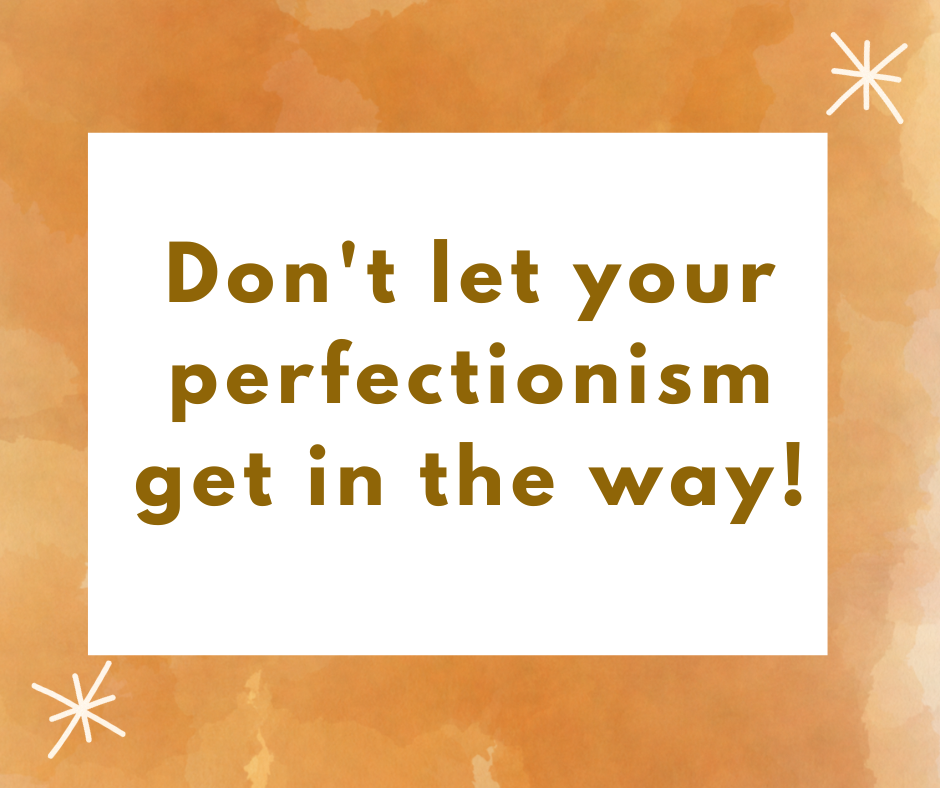The pain of perfection led me to extreme burnout, over working, negative self-talk, never let them see you sweat mentality. It meant putting a mask on every day to be the best high tech employee, wife, and mother I could be. An impossible task. Intellectually, I knew I couldn’t be perfect but if I strived and tried hard enough, I could be close and at least be called a success. I wasn’t happy and I wasn’t healthy physically or emotionally.
Brene’ Brown’s quote sums up where I was and maybe where you might find yourself. “If I look perfect and do everything perfectly, I can avoid or minimize the painful feelings of shame, judgment and blame.”
Perfectionism is not positive or negative on its own. A drive to do well and having high standards can be positive. It can turn negative when it becomes overly negative, self-critical, fear based, overly critical of others, and setting unrealistic expectations with yourself and/or others.
Often my clients bring up this topic especially in their work life: talking about working with/for a perfectionist or overcoming their own perfectionism. Most don’t want to be like this, work for or associate with the person whose always nit picking, critical, self-doubting, burned out, setting unrealistic super high goals, or pointing out flaws. Signs and behaviors can reveal if you might be a perfectionist.
Potential Signs and Behaviors of Perfectionists
- Fear of failure
- Fear of making mistakes
- Seeking control
- Fear of disapproval
- Excessive list making and/or organizing
- Procrastination
- Low self-esteem
- All or none thinking
- Correcting or repeating
- Lack of delegation
- Avoidance
- Seeking reassurance
- Checking and re-checking and rechecking…
- Challenges in making a decision
- Overcompensation
- Focused only on results
- Burnout
Do you see any of the behaviors or signs above in yourself or someone you care for? See below for strategies for working with and through.
Strategies for Working with and Through Perfectionism
1. Stop comparing yourself to others
2. Complete and imperfect vs. perfect and undone
3. Be mindful of self-talk – work on positive self-talk
4. Reframe negative self-talk
5. Write out positive affirmations
6. Work towards a growth flexible mindset vs fixed rigid
7. Practice mindfulness – being in the present moment vs. past or future
8. Meditation in the present moment
9. Avoid procrastination
10 .Set micro goals for yourself and celebrate milestones
11. Celebrate wins
12. Lean into making mistakes
It’s normal to want to do well and work toward excellence. Do your best. Be mindful to not hurt yourself in that work or strive for perfection.
If you or someone you know is challenged with perfectionism or has been knocked down reach out and contact me. I provide a safe place to work toward being comfortable with the imperfect.
I have space for one client in December. If that’s you or someone you know please contact me. Let’s have a conversation to see how I can be of support.
Latest client wins – Trusted leadership gut and saved money and time at work! Applied for that stretch job! Working through tricky conflict with tools to support conversation. My clients are doing the hard work and seeing results! Grateful to be doing this work.
Follow me on social media for insightful questions, tips, and motivational quotes.
Peace, and blessings,
Teresa – Mindfully embodying Ms. Frizzel – “Take chances, make mistakes and get messy!”
Teresa Q. Bitner, M.Ed., PMP, PCC - Resiliency, Change and Loss Coach
Partnering with those who have been knocked down by life and want to build resiliency and move forward and live a bold life.
[email protected]
www.boldfulfilledlifecoach.com
Author of:
- Soul Love: How A Dog Taught Me to Breathe Again
- The First Days: Coping with Life after Loss (updated 2nd edition)
- Explorations into the Being and Doing of Coaching: A collection of voices, insights, and wisdom from Austin area coaches


 RSS Feed
RSS Feed